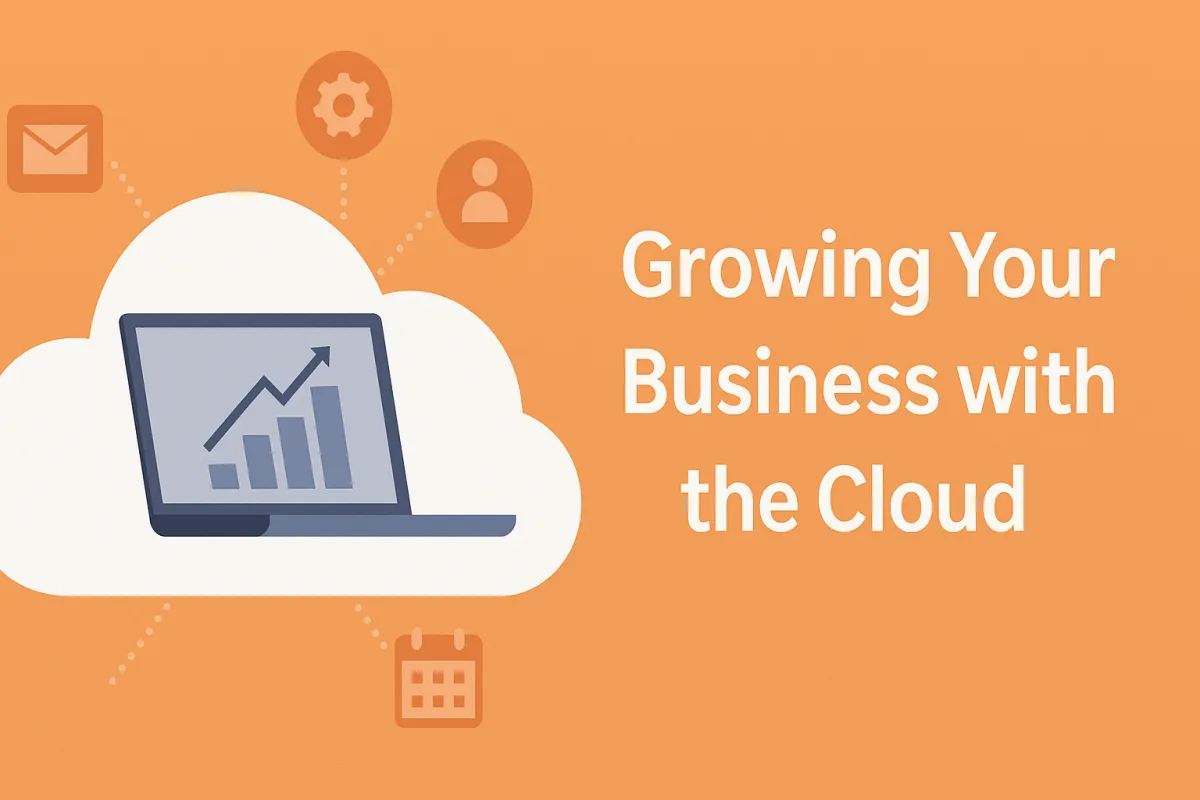Blogs
Blog

The Future of Growth Lives in the Cloud
In today’s world, many businesses—big and small—are using cloud-based solutions to power growth. If you hear “the cloud” and think it’s too techy or risky, you’re not alone. But cloud solutions have become a key building block for modern, scalable, flexible businesses. Here’s why they're so important and how they support growth.
What Is a Cloud-Based Solution?
First, a simple definition: a cloud-based solution is any software, server, storage, or service that lives on remote computers (data centers) and is accessed over the internet. You don’t need to own or maintain all the hardware yourself. You just connect.
The cloud includes things like cloud storage, cloud software (SaaS), cloud servers (IaaS), and platforms for building apps (PaaS).
1. Lower Upfront Costs & Shift to Pay-As-You-Go
One of the most powerful advantages is you don’t have to spend big money up front on servers, hardware, and infrastructure. Instead, you pay as you use.
You avoid overpaying for capacity you don’t need.
Your monthly or subscription costs are more predictable.
You free up cash to invest in growth.
This shift from fixed costs (big capital spending) to variable costs (paying for usage) gives you more flexibility.
2. Scalability & Flexibility
As your business grows, your needs change. The cloud lets you scale up or down easily.
If you suddenly get more users, you can increase capacity immediately.
If you have slower periods, you can scale back so you're not wasting money.
You don’t get stuck with hardware that becomes outdated or underused.
This flexibility helps you respond to demand without major delays.
3. Faster Time to Market & Innovation
With cloud infrastructure, you can deploy new software, services, or updates much faster. You don’t wait weeks to set up servers. You spin up resources in minutes. That speed means you can try new ideas, test services, and improve faster.
Also, many cloud services include built-in features (analytics, AI, security) you don’t have to build from scratch. That accelerates innovation.
4. Better Collaboration & Access Anywhere
Cloud solutions enable your team to work from anywhere. All they need is an internet connection and a device.
Remote work becomes easier.
Team members can access the same data and tools, reducing silos.
Updates or files are shared instantly.
This kind of unified access improves communication, avoids version problems, and keeps everyone in sync.
5. Data Protection, Backup & Business Continuity
One big scary risk for businesses is losing data. Hardware fails. Disasters happen.
Cloud providers often include built-in backup, data mirroring, redundancy, and disaster recovery features. If something goes wrong, your data is safe, and you can continue operations.
Also, many cloud services automatically update and maintain software and security patches. You benefit from up-to-date protection without managing it yourself.
6. Enhanced Security & Compliance
Because major cloud providers host many clients, they invest heavily in advanced security measures: encryption, firewalls, identity management, monitoring, and compliance frameworks.
For many small businesses, using a reputable cloud provider gives levels of security they couldn’t afford alone.
Plus, cloud providers often help with certifications (GDPR, HIPAA, etc.), which can give customers confidence.
7. Smarter Insights & Analytics
Cloud platforms can collect and process large amounts of data. With that data, you can derive insights:
Which products or services do best?
What time of day is slow or busy?
What marketing is effective?
Using cloud analytics tools helps you make smarter decisions, not guess.
Why It’s a “Foundation” for Growth
When you build your business on cloud solutions, you’re setting up a flexible, resilient base.
You can experiment and evolve without being locked into old systems.
You can grow without needing a massive infrastructure overhaul.
You can deliver a better experience to customers (fast, available, secure).
You can move quickly and adapt to change.
That’s why many businesses today see cloud as the foundation—all other digital tools and innovations work best when built on cloud infrastructure.
If you want to explore how cloud can transform your business in a practical way, CLR Solutions.
5 FAQs
Q1. Is cloud always cheaper than owning servers?
A: Often yes, especially when you factor in maintenance, upgrades, staffing, and downtime. But you must pick the right cloud plan and optimize usage. Want help comparing cloud vs on-premises for your business? Reach out here
Q2. Will my business data be safe in the cloud?
A: Yes—if you choose a trusted provider and use best practices (strong passwords, encryption, backups). Many cloud providers have top-tier security built in. We can help you choose a secure cloud setup. Contact us
Q3. Can small or non-tech businesses use cloud too?
A: Absolutely. Many cloud tools are designed for everyday users. You don’t need to be an expert. You can start small and grow. Let’s pick cloud tools suited for your business. Let’s talk
Q4. What happens if I outgrow my cloud plan?
A: It’s usually easy to upgrade. Because cloud is scalable, you can move to higher tiers or add capacity without major disruption. We can plan your growth path in the cloud. Get in touch
Q5. How do we get started migrating to cloud?
A: First, audit which systems you already use. Choose one area (file storage, customer data, website) to move first. Then plan step by step, test, and train your team. We can help you build your cloud migration roadmap.Start here

Whether you’re looking to increase visibility on search engines, build a stronger brand or increase traffic to your website, you need a Digital Marketing Company that can deliver the desired results.
Copyright © 2026 CLR Solutions. All Rights Reserved. Powered by CLR Solutions

Explore a better way to grow

Whether you’re looking to increase visibility on search engines, build a stronger brand or increase traffic to your website, you need a Digital Marketing Company that can deliver the desired results.



















